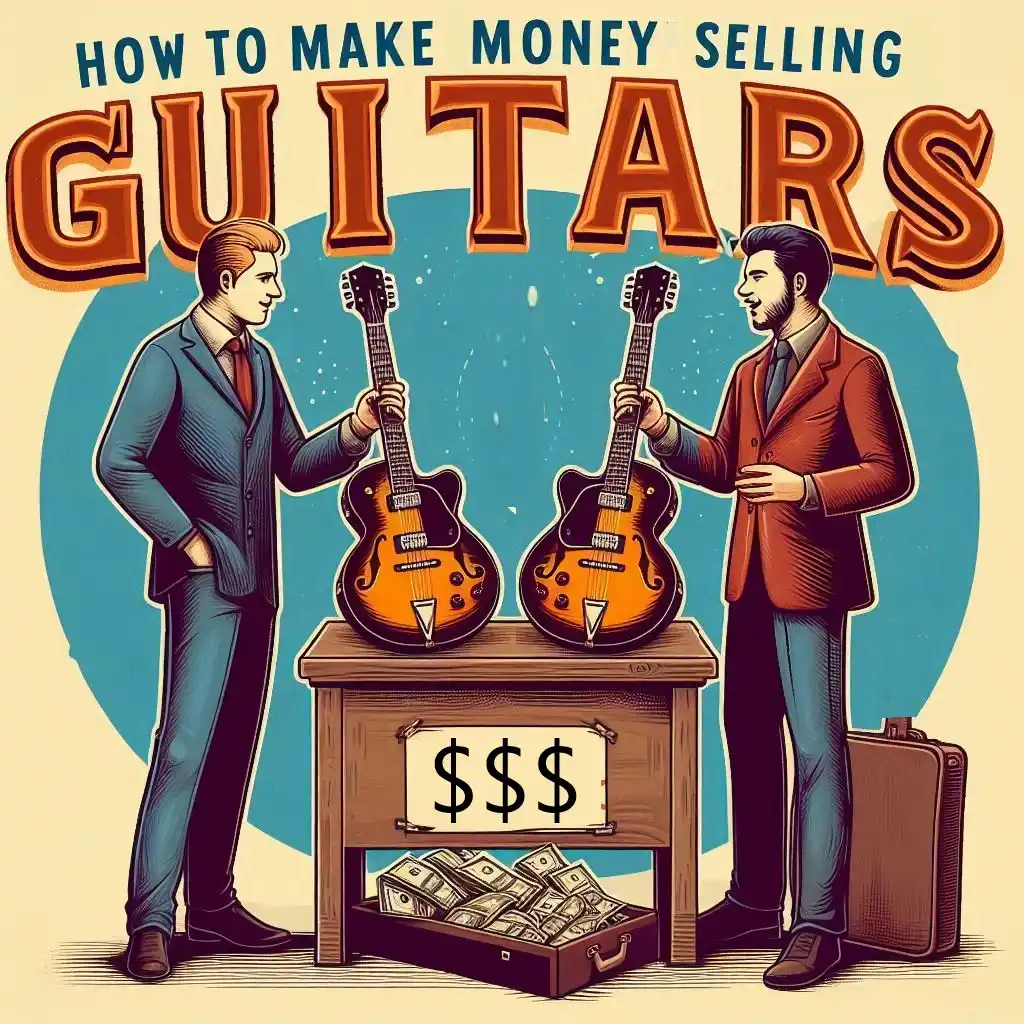
7 Tips How to Make Money Selling Guitars
If you’ve stumbled across this guide, it’s probably because you’re a guitar fan and want to turn that passion into money. Whether you’re a seasoned guitar dealer or someone who just found a vintage Fender at a garage sale, this guide is for you.
Let’s find out how you can make a lot of money from this.
Table of Contents
1. Understanding the Guitar Market
Before you can sell a guitar, you gotta know a guitar. Spend some time familiarizing yourself with different brands, types, and the intricacies of guitar craftsmanship. From acoustic and electric to bass and classical, the guitar world is vast.
- Popular Brands: Gibson, Fender, Ibanez, Martin, Yamaha, Epiphone, and Taylor.
- Types of Guitars: Acoustic, Electric, Bass, Classical, Resonator, and Twelve-String.
- The Craftsmanship: Learn about tonewoods, hardware, pickups, and finishes. These elements not only affect the guitar’s sound but its price too.
The guitar market, much like fashion, is subject to trends. One year, everyone might be going gaga over a vintage Stratocaster, and the next, they’re hunting for a rare Gibson.
Keep an eye on:
- Guitar forums;
- Music magazines;
- Social media groups;
- Auction sites.
These platforms can give you insights into what’s hot and what’s not.
2. Sourcing Guitars to Sell
Hit the Garage Sales & Thrift Stores.
You’d be amazed at what you can find when you dig a little. Some folks sell off old guitars, not realizing their value, especially if they’ve been collecting dust in an attic. With a sharp eye (and a bit of luck), you can score some real gems for dirt cheap.
Network with Musicians.
Attend local gigs, join musician forums, or simply hang out at music stores. Build relationships with musicians – many of them often want to offload older gear when they upgrade, and you could snag some deals directly from the source.
Bulk Buys from Manufacturers.
If you’re thinking big, consider buying in bulk directly from manufacturers. This approach requires more capital upfront but can lead to larger profits if you sell at competitive prices.
3. The Art of the Sale
Setting Up Shop.
Where you sell your guitars plays a big role in how much you make. Here are some platforms to consider:
- Online Marketplaces: Websites like Reverb, eBay, and even Amazon can be goldmines for guitar sales. Set up a seller account, list your items, and wait for the bids to roll in.
- Your Own Website: If you’re tech-savvy, create your own website. Platforms like Shopify or WordPress make it easy. This gives you control over branding, pricing, and promotions.
- Physical Storefront: Dreaming big? Consider opening a physical store. This option requires the most capital and commitment but can establish you as a local guitar hotspot.
Pricing It Right.
Don’t just slap a price on a guitar without doing your research. Compare similar listings, and consider the guitar’s condition, rarity, brand, and model. Remember, it’s okay to start high; you can always negotiate down.
Promotion is Key.
Listing a guitar isn’t enough. You’ve got to promote it. Share your listings on social media, offer promotions, create engaging content around guitars, or even collaborate with local musicians for promotional gigs.
4. Building Trust & Reputation
Be Honest.
Always be upfront about the condition of the guitar. If there’s a scratch or a ding, disclose it. Honesty not only prevents future disputes but builds trust with your customers.
Offer Returns.
While it might sting a bit, offering a return policy can instill confidence in potential buyers. They’ll be more inclined to purchase if they know they aren’t stuck with it.
Engage with the Community.
Remember, selling guitars isn’t just about the transaction. Engage with the musical community. Attend local events, sponsor a school’s music program, or host guitar lessons. These connections can lead to sales and establish you as a trusted figure in the industry.
5. Refurbishing & Repairs: The Added Value
Upcycling Old Guitars.
Sometimes, the difference between a guitar that’s ‘meh’ and one that’s ‘wow’ is just a new set of strings and a bit of polish. Investing time and a little money into refurbishing old or damaged guitars can significantly boost their sale price. Remember:
- Clean It Up: Even just wiping off the dust, cleaning the fretboard, and polishing it up can make a world of difference.
- Re-String: Fresh strings can breathe new life into a guitar’s sound.
- Minor Repairs: Learn some basic guitar repair skills or collaborate with a local luthier. Fixing dents, replacing tuning pegs, or even just adjusting the action can enhance the guitar’s value.
Customization.
Want to stand out in the crowd? Offer customization options. From custom paint jobs to unique pickguards or personalized hardware, giving people the chance to own a one-of-a-kind guitar can fetch you higher prices.
6. Understanding and Managing Profits
Keep Track of Finances.
It might sound boring, but keeping track of your income and expenses is crucial. Use software or apps like QuickBooks or even just a good ol’ Excel spreadsheet. Remember to factor in listing fees, shipping costs, and any taxes.
Reinvest in Your Business.
Don’t spend all your profits on that sweet new amp you’ve been eyeing. To grow, you’ll need to reinvest. Whether it’s buying more stock, upgrading your online store, or investing in marketing, make sure a portion of your earnings goes back into the business.
7. Customer Service
Engage and Respond.
Be active on your sales platforms. Answer questions, provide additional information when asked, and always be polite. A responsive seller attracts more buyers.
Feedback is Gold.
Encourage your customers to leave reviews. Positive feedback can boost your credibility immensely. And hey, if you get some constructive criticism, embrace it and use it to improve.
Loyalty Programs and Deals.
Consider offering loyalty programs or deals for repeat customers. Maybe a discount on their next purchase or even a free guitar pick. Small gestures can lead to long-term loyalty.
8. Expanding Your Guitar Empire
Diversify Your Inventory.
Don’t just stick to one type or brand of guitar. The more diverse your collection, the wider your audience. From budget-friendly beginner guitars to high-end vintage collectibles, cater to all segments of the market.
Collaborations & Partnerships.
Consider teaming up with local musicians, bands, or music schools. They can promote your store, and in return, you can offer them discounts or sponsor their events.
Stay Updated & Educate Yourself.
The guitar industry, like all others, evolves. New models come out, old ones become vintage, and market demands shift. Continuously educate yourself, attend guitar expos, join workshops, or simply subscribe to guitar magazines.
Final Thoughts.
Turning a passion for guitars into a profitable business isn’t just about buying low and selling high. It’s about understanding the market, building relationships, offering value, and constantly evolving.
Whether you’re selling from your bedroom or a swanky downtown store, remember that every guitar has a story – from the hands that crafted it to the ones that play it.
Your job? Make sure that story sings… or at least, make sure it sells.
